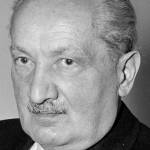This week in Contemporary European Philosophy we are reading Martin Heidegger’s “What Is Metaphysics?” In this recent survey (dominated by philosophers from the English-speaking world), Heidegger ranks as the 18th  most-identified-with non-living philosopher. “What Is Metaphysics?” was first delivered in 1929 as Heidegger’s inaugural lecture at the University of Freiburg.
most-identified-with non-living philosopher. “What Is Metaphysics?” was first delivered in 1929 as Heidegger’s inaugural lecture at the University of Freiburg.
Here is my summary of Heidegger’s distinctiveness and his contribution to postmodernism. Also two related posts: “Heidegger and National Socialism” (with quotations from Brüggemeier, Cioc, and Zeller’s How Green Were the Nazis?: Nature, Environment, and Nation in the Third Reich), and “Heidegger, Anti-humanism, and the Left” (which takes off from Tim Black’s sp!ked review, “Why they’re really scared of Heidegger”). Both posts probe the issue of how strong the connections are between Heidegger’s abstract philosophy and his disturbing social and political views.
“This week in Contemporary European Philosophy we are reading Martin Heidegger’s ‘What Is Metaphysics?'”
People still read Heidegger? Amazing.
Heidegger is a growth industry.
I agree that Heidegger is a growth industry. It would be extremely difficult to understand the intellectual developments of the later 20th and early 21st centuries without a cursory understanding of his work.
I am also currently re-reading “What is Metaphysics” along with some philosophically minded friends. I have also recently read his essay “On the Essence of Ground”. I was wondering if you had any thoughts on the connections between the “Nothing” in “WM” and the notion of “Ground” in the latter essay — especially given Heidegger’s later “Introduction to ‘WM'” that explicitly ties the question to the ground in which metaphysics (as roots) grow.
thanks,
TW
I read “What is Metaphysics” entirely through the lense of psychedelics, although of course I’m not suggesting that H. indulged in any Black Forest mushrooms.
This could make an interesting weekend “module” course for undergraduates.